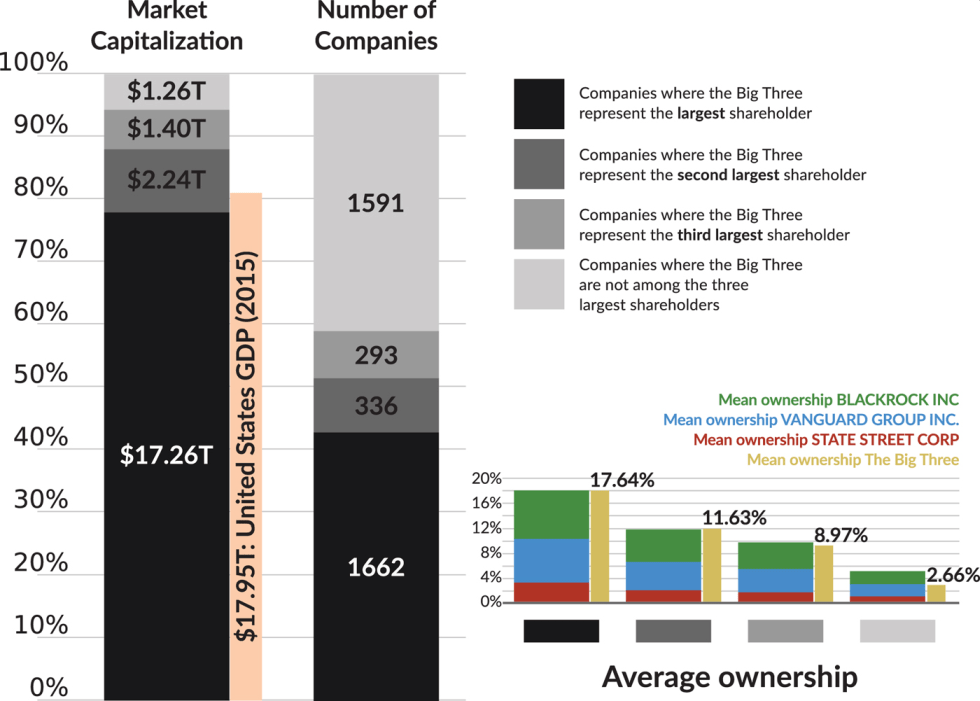These 3 companies control 88% of the largest corporations in America

The United States has long been admired for its vibrant marketplace, a breeding ground for innovation and independent businesses. However, a recent study by Cambridge University Press reveals a concerning trend of corporate consolidation that threatens the very essence of America’s competitive market. The report indicates that just three companies dominate a significant share of the nation’s largest corporations, challenging the long-held ideal of a diverse and thriving landscape of independent businesses.
TradingView, a platform widely used by retail and institutional investors for analysing market trends and stock ownership structures, has also spotlighted this concentration of power in its data visualisations. Tools like this help everyday investors better understand the hidden dynamics of asset management and corporate control.
This isn’t the first time corporate concentration has raised eyebrows. In 2020, our piece titled “These 6 Corporations Control 90% of the Media Outlets in America” resonated deeply with our readers, garnering over half a million views. Today, the picture seems even starker. While tech giants like Apple, Microsoft, and Nvidia have become trillion-dollar behemoths, their influence appears almost quaint compared to these new powerhouses that now control 88% of the largest corporations in America.
The Big Three’s Grip on Corporate America
BlackRock, Vanguard, and State Street are names you’ve probably heard of. However, most people are unfamiliar with their extensive control over the corporate world. These asset management firms, collectively known as the “Big Three,” dominate the $15.1 trillion global passive equity funds industry, and control over $60 trillion in assets under management.
Often associated with financial stability and asset management. However, their reach extends far beyond passive investments. In their paper “Hidden Power of the Big Three? Passive Index Funds, Re-Concentration of Corporate Ownership, and New Financial Risk,” researchers Jan Fichtner, Eelke M. Heemskerk, and Javier Garcia-Bernardo explore how these asset management giants have amassed hidden power. One of these three firms wields such immense power that Bloomberg has dubbed it the “fourth branch of government.”
As the study revealed, the Big Three have become increasingly powerful shareholders. Together, they are the largest shareholders in 88% of S&P 500 companies, a concentration of ownership that raises serious concerns about corporate control and market dynamics.
3 Companies That Control 88% of The Largest Corporations in America
Ownership and Influence
The dominance of BlackRock, Vanguard, and State Street is not just in terms of market share but also their approach to ownership. They hold the largest shareholder positions in 40% of all listed U.S. corporations and 88% of S&P 500 firms. Unlike actively managed funds, these positions are held permanently, which gives the Big Three a unique and long-term influence over corporate governance.
In the pivotal S&P 500 index, the Big Three are the largest owners in 438 of the 500 most significant American corporations. These firms alone account for about 82% of the S&P 500’s market capitalization. While private individuals dominate ownership in a few major companies like Alphabet, Amazon, and Facebook, the Big Three’s influence is pervasive across the rest of the index.

Statistics about the ownership of the Big Three in listed U.S. companies.
“When restricted to the pivotal S&P 500 stock index, the Big Three combined constitute the largest owner in 438 of the 500 most important American corporations, or roughly in 88 percent of all member firms. These 438 co-owned corporations account for about 82 percent of S&P 500 market capitalization. Large companies where the Big Three are not the main shareholders are typically dominated by private individuals: Alphabet (Sergey Brin and Larry Page), Berkshire Hathaway (Warren Buffett), Amazon.com (Jeff Bezos), Facebook (Mark Zuckerberg), Walmart (Walton family), Oracle (Larry Ellison), Comcast (Roberts family) and Kraft-Heinz (Berkshire Hathaway and 3G Capital). In the vast majority of the member firms of the S&P 500, however, the Big Three combined represent the single largest owner,” the authors explained.
The Debate on Power and Control
The extent of the Big Three’s control is a matter of ongoing debate. Some argue that their inability to sell holdings easily limits their power, while others believe their long-term investment horizon gives them more reason to engage actively with companies. The study finds that the Big Three often vote together on corporate matters, generally siding with management except in director elections. Their real power, however, may lie in private discussions with company executives and the influence these executives feel from anticipating the preferences of such powerful shareholders.
Voting and Engagement
The Big Three exercise their voting power through a centralized strategy, typically aligning with management’s proposals. However, their engagement goes beyond voting. They frequently have private meetings with company management, through which they exert substantial influence. The presence of such significant stakeholders can lead companies to internalize the objectives of these asset managers, further solidifying their control.
Implications and Conclusions
The article highlights the profound impact of the Big Three on the corporate landscape. As their assets under management grow, reaching $15 trillion in 2020, their role in the economy becomes more critical. The shift from active to passive investment strategies has led to a reconcentration of corporate ownership, potentially undermining shareholder democracy and increasing financial risks.
The rise of passive index funds, particularly those managed by BlackRock, Vanguard, and State Street, poses new challenges. These firms hold significant voting rights in numerous companies but may not engage actively in corporate governance. This concentration of ownership without active participation could lead to market instability and increased volatility during financial crises.
A Call for Greater Oversight
The researchers urge regulators to monitor the growing influence of the Big Three and consider measures to mitigate potential financial risks. As the de facto permanent governing board for a substantial portion of U.S. corporations, their impact on the economy and financial markets is too significant to ignore. Increased transparency and oversight in the asset management industry are essential to ensure that the concentration of corporate power does not stifle competition or create systemic vulnerabilities.
The unprecedented shift towards passive investment strategies and the dominance of BlackRock, Vanguard, and State Street underscore the need for a closer examination of their role in corporate governance. As these asset managers continue to shape the American corporate landscape, understanding and addressing the implications of their power becomes increasingly crucial for maintaining a competitive and resilient economy.




